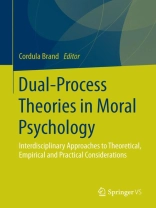This anthology offers a unique collection of contributions focusing on the discussion about the so-called dual-process theories within the field of moral psychology. In general, dual-process theories state that in cognitive systems, two sorts of processes can be differentiated: an affective, associative process and an analytical, rule-based process. This distinction recently entered the debate on the relationship between intuitive and rational approaches to explaining the phenomenon of moral judgment. The increasing interest in these theories raises questions concerning their general impact on social contexts. The anthology aims at presenting stepping-stones of an analysis of the merits and drawbacks of this development. For that purpose, the authors discuss general questions concerning the relationship between ethics and empirical sciences, methodological questions, reassessments of established terminology and societal implications of dual-process theories in moral psychology.
Table of Content
Prologue: Morality.- Part I: On the Relationship Between Ethics and Empirical Sciences.- Part II: Empirical Approaches in Recent Moral Psychology Research.- Part III: Reassessments of Established Terminology in Modern Debates.- Part IV: Societal Implications of Dual-Process Theories in Moral Psychology.- Epilogue: The Word Thief.
About the author
Cordula Brand is a philosopher who is working at the International Centre for Ethics in the Sciences and Humanities (IZEW, University of Tuebingen).












